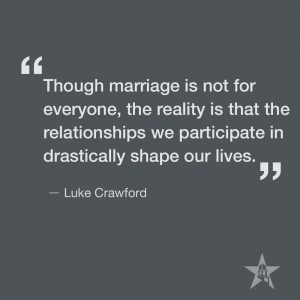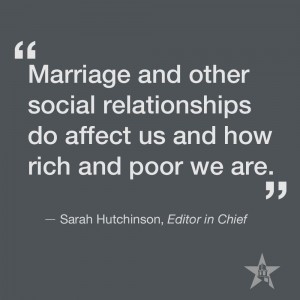Lydia Wilson’s article on Christian perspectives towards marriage in the January 24th edition of the Star both encouraged and intrigued me. Her work has often prompted me to consider my faith from a new perspective, and I found myself, after reading her introductory paragraph, wondering, if marriage is not the “end all and be all” of life (which, sadly, many Christians idolize it to be) what is, and how should we approach singleness, dating, and marriage in light of that?
I believe Miss Wilson touches on the answer when she writes:
 “Marriage is not intended to be in the forefront of every single person’s mind. Rather, it should be seen as an unnecessary and very serious step, one that only need be taken if one finds a true partner, someone that they cannot possibly live without, and most importantly, someone who will not distract them from doing the work of the Lord, but instead be compatible and work with them.”
“Marriage is not intended to be in the forefront of every single person’s mind. Rather, it should be seen as an unnecessary and very serious step, one that only need be taken if one finds a true partner, someone that they cannot possibly live without, and most importantly, someone who will not distract them from doing the work of the Lord, but instead be compatible and work with them.”
Though marriage is not for everyone, the reality is that the relationships we participate in drastically shape our lives, whether that be our family, peers, or significant other. In the gospel of Matthew Jesus quotes the Old Testament and simultaneously places immense importance on relationships when he declares that the greatest commandment is to “love the Lord your God with all your heart, soul, mind, and strength, and love your neighbor as yourself.” Essentially, we exist to respond to the awesome love of God expressed through Christ with all of our lives, and, as a result, truly love others regardless of the nature of our relationship with them. As pastor David Platt states, “Proclaiming the love of Christ is the overflow from sharing in the life of Christ.” Two central concepts correlating to this perspective, integral to living out the love of God in relationships, are holiness and worship.
In both marriage and celibacy we are invited to be profoundly shaped through the responsibilities that come with either relationship status. As a single person, I am called to fast from intimacy. At times, this responsibility can be very taxing in light of external cultural pressures, as well as the personal desire to love and be loved. Through exercising the discipline of self control, however, I am gradually learning what it is to place my confidence and hope in Christ over that which I, at times, most long for. Moreover, in striving to wholeheartedly embrace the opportunity to be as effective as possible during this time of singleness, I discover what it means to worship God in light of the season of life that I find myself in.
In the same way, those who participate in the intimacy of marriage at times endure moments of strain, during which they have to set aside their own longings and selflessly serve their spouse despite the very real desire to ignore all commitments. Nevertheless, in choosing to put their spouse first, those who are married discover what it means to give and receive the selfless, unconditional love of Christ. Thus, as they grow as individuals and their marriage evolves they are continuously discovering God more fully as they live out the love of Christ.
Both singleness and marriage involve life responsibilities in which we, in responding well, can be molded in the likeness of Christ and live in worship to him. How does this apply, however, to those who are caught in between; those individuals whom we classify as “dating”, “courting”, “talking”, “pursing marriage”, or some variation thereof? Recently a close married friend of mine shared the following advice with me regarding the core pillars on which healthy relationships, and ultimately marriages, are built. Firstly, healthy relationships involve a deep soul relationship, a closeness represented by a fun, vibrant friendship which provides a solid foundation for pursuing romance. Secondly, they demonstrate a sincere and devoted love for God which powerfully shapes their lives as individuals and a couple. Lastly, and only in the context of marriage, both individuals enjoy and invest in the beauty of physical intimacy. For those pursuing a healthy romantic relationship, their focus should firstly center on the calibre of their friendship. As they grow to more deeply love and understand one another, their relationship should be a source of mutual spiritual edification; indeed they should not only grow individually, but witness Christ equipping them together to be potently effective for his kingdom. Lastly, under the covenant of marriage, they are able to discover and celebrate their love within the context of physical intimacy.
The beauty of relationships, whether they involve family, friends, or lovers, is that they are not the be all and end all, nor are they simply the means to an end. Rather, they exist as a beautiful testimony to the ongoing work of Christ in our lives. As J.C. Ryle states, “relationships can be a great blessing, or a great curse, depending on where we place the Cross.” May we, as we continuously embrace the process of being made holy through growing in the likeness of Christ and worshiping Him in all things, discover the all-sufficiency of Christ within us in every relationship that we are a part of.



